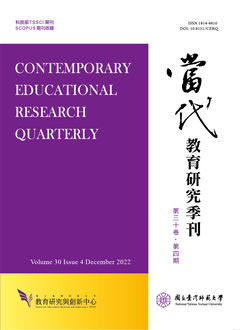

性別平等教育成為國定教育政策,是我國基礎教育課程改革,更是因應全球化所進行的一次變革。然而性別平等教育一方面順應全球趨勢,快速發展,另一方面卻又因為經濟全球化效應,面臨質變與侵蝕現象,國家在擬定性別平等教育政策時,應如何權衡,產生了兩難問題。<br /> 本研究即探討臺灣在全球化脈絡下,性別平等教育政策的制定情形與面臨的問題。首先藉由文獻分析全球化對世界性別平等教育發展的影響,從中瞭解助長性別平等教育發展的動力,以及全球化效應下性別平等教育所面臨的兩難現象。而後檢視臺灣性別平等教育政策的制定情形,並就臺灣性別平等教育政策的發展歷程,分析全球化對臺灣性別平等教育所產生的衝擊與影響。<br /> 最後希望借鏡世界性別平等教育發展的軌跡,提醒我國教育機構在制定性別平等教育政策時,能以「全球視野,在地實踐」的思維,關注到更廣泛的性別平等和社會正義。
<p><span style="font-size: 11pt; color: black; font-family: 'Times New Roman'"> The main purpose of this article is to explore the reformation of gender equity education in Taiwan's national policies under the process and pressure of globalization.</span></p><p><span style="font-size: 11pt; color: black; font-family: 'Times New Roman'"> </span><span style="font-size: 11pt; color: black; font-family: 'Times New Roman'"> After examining the influence of economic globalization on gender equity education in the world, we find that globalization processes work in contradictory ways. The modernization of the gender regime has restructured gender inequalities and developed a new disadvantaged minority. And, as we investigate the impact of these crosscutting changes in policies that aimed at gender equity in Taiwan, we find that market practices underpinning economic globalization undermine gains that have been achieved in gender equity education.</span></p><p><span style="font-size: 11pt; color: black; font-family: 'Times New Roman'"> Since current reform proposals do not address inequities in the financial crises by globalization, we suggest changes must be made in funding policies that could provide security to every gender under crises.</span></p><p><span style="font-size: 11pt; color: black; line-height: 150%; font-family: 'Times New Roman'"> Finally, the article suggests some possible ways ahead for new gender equity policies in education in terms of social class, difference and achievements. These suggestions are proposed against the current restructuring of educational systems, schools and policy approaches to a re-articulated conception of gender equity. The article concludes that this influence is significant and should be taken into account by policy-makers.</span></p>

本著作係採用創用 CC 姓名標示-非商業性 3.0 台灣 授權條款授權.
本刊國立台灣師範大學教育研究與創新中心
106台北市和平東路一段162號 | 電話: 02-7749-3670 | E-mail: cerecerq@gmail.com
教創中心 | 師大 | 電子報 | 線上投審系統
本刊由國家科學及技術委員會人文社會科學研究中心補助經費
© 2014 CERI-NTNU
